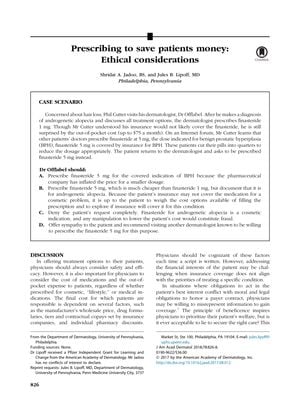Prescribing to Save Patients Money: Ethical Considerations
March 2018
in “
Journal of The American Academy of Dermatology
”

TLDR Doctors should prescribe cheaper, off-label medication and teach patients how to use it to save money ethically.
In the document from April 1, 2018, a case scenario is presented where a patient with androgenetic alopecia is prescribed finasteride 1 mg, which is not covered by insurance, leading to high out-of-pocket costs. The patient learns that finasteride 5 mg, prescribed for benign prostatic hyperplasia (BPH), is cheaper and covered by insurance, and asks his dermatologist to prescribe this higher dose to be split into quarters. The ethical dilemma discussed is whether the dermatologist should prescribe finasteride 5 mg off-label for androgenetic alopecia, which is cheaper even without insurance coverage, and instruct the patient on how to split the tablets, without misrepresenting the diagnosis to the insurance company. The document concludes that prescribing finasteride 5 mg off-label and instructing the patient to split the tablets is the best ethical choice, as it helps the patient save money while maintaining honesty with the insurance company. The document emphasizes the importance of considering the cost of medications and the financial burden on patients when prescribing treatments, and suggests that physicians have an obligation to offer alternative care options that may reduce financial burdens.





